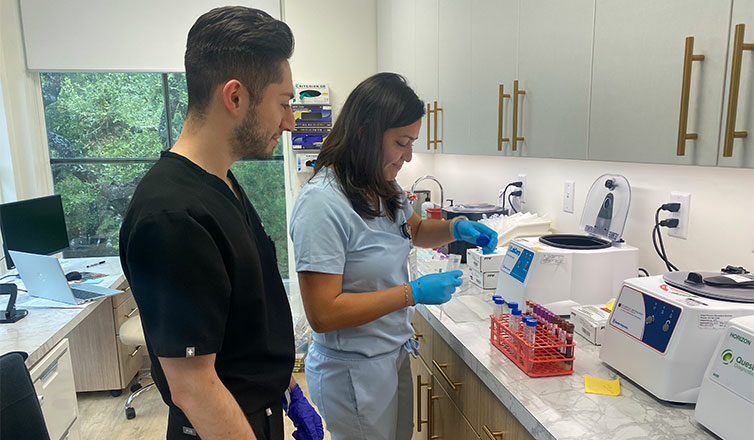So little is known about rare diseases that treatments and cures are not always available. Fortunately, patients with rare diseases have a unique opportunity to access cutting-edge treatments while helping to advance medicine – clinical trials.
Clinical trials are research studies that help experts figure out whether new treatments are safe. They also help researchers determine whether a treatment has less harmful side effects or is more effective than other options.
Before a clinical trial begins, researchers conduct tests to find out whether the drug or device is safe and effective. If those test results look promising, the U.S. Food and Drug Administration (FDA) must approve the treatment before it can be tested on people.
Clinical trials are made up of four phases:
- Phase 1 tests an intervention on a small group of people for safety, dosage and side effects.
- Phase 2 tests a larger group of people to see whether the drug or device is effective and to gather preliminary data on whether the intervention is effective for those with a certain disease or condition. These trials continue to monitor the treatment for safety and short-term side effects.
- Phase 3 collects more information from a large group — anywhere from several hundred to a few thousand people — about effectiveness and safety. In this phase, researchers monitor the treatment in different populations and dosages. They also compare the drug or device with other treatments. If the researchers and the FDA agree that the results of the clinical trial support the treatment’s use for the health condition, the FDA will approve the treatment.
- Phase 4 occurs after FDA approval. It may take more time for long-term side effects to become apparent, so researchers continue to observe the treatment for safety and effectiveness in large, diverse populations.
If a study ends in phase 3, most patients can continue to get the drug tested in the trial until FDA approval of the medication.
The most common and best type of clinical research trial is a double-blind placebo-controlled study. In this type of study, some participants receive the actual treatment while others receive a placebo treatment. No one involved, including the researchers and participants, knows which treatment each patient receives.
Clinical trials can be a great opportunity for patients who have tried current treatments and need an alternative. In order to support our commitment to research and clinical advancement for neuromuscular disorders while offering our patients the option to participate in a clinical trial right in their own doctor’s office, Austin Neuromuscular Center established National Neuromuscular Research Institute (NNRI).
The institute has a team of highly trained clinical research coordinators and quality control officers on-site, and NNRI is equipped with a dedicated research infusion suite, lab, and pharmacy. This enables ANC to provide patients with continuous care, with all visits, procedures, labs, doctors and pharmacy in one location.
NNRI is a leader in clinical research. We enrolled the first randomized patient in the United States for a clinical trial studying chronic inflammatory demyelinating polyneuropathy (CIDP), a chronic autoimmune disease of the peripheral nervous system. Patients with this disease experience progressive muscle weakness and numbness. There is no cure for CIDP.
NNRI is a top enroller for the VALOR study for adults with dermatomyositis who are not responding to current treatments. We are also actively enrolling patients for a clinical trial studying inclusion body myositis, for which there is no current treatment.
Patient safety is our top priority. Most clinical trials we conduct are in phase 2 or 3, testing the efficacy and safety of the investigational medication. In addition to FDA approval, our staff members are trained in research guidelines and most studies are monitored by a clinical research organization, a third-party company that performs quality assurance checks and visits the study site often.
For more information about NNRI and whether a clinical trial might be an option for you, contact us at (512) 920-0140. And don’t forget to follow us on Facebook and Instagram for important updates.
